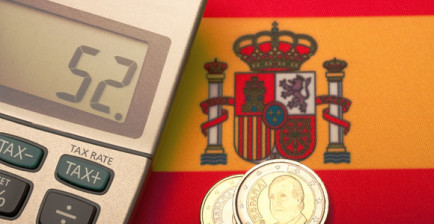
The amount of tax available to Spanish authorities this year is the highest ever, data shows.
Very few people like the idea of paying higher taxes, but often the reality of higher taxes is more favourable than the reality of lower taxes.
Take Greece or the USA, for example. Many Americans hold tightly to their libertarian ideals, and many presidential candidates that whisper the words “higher taxes” are given short shrift by the populace. And the result? Poor levels of universal healthcare, very little in the way of parental leave, and badly underfunded roads and public transport in the big cities…
As for Greece, the company has wrestled these past few years with the economic damage caused by the culture of tax avoidance that was rife for many decades in the country. Sure, some individuals were able to become nicely off thank-you-very-much, but wider society suffered – and continues to suffer – badly.
Spain has always had a more liberal, socialist approach to tax. Income tax is generally higher in Spain than in, say, the UK, while companies also have to pay quite high taxes on profit. But the evidence of where this tax money goes is usually there for all to see. Resorts, roads, beaches and cities are clean, increasingly modern and attractive, and very safe. So if higher taxes are what it takes to maintain this, many Spaniards will say “bring it on!”
With that in mind, the news that Spain will collect €200.9 billion in taxes nationwide this year should be welcomed. This is largely good news for a couple of reasons: one, it shows that Spain’s businesses and individuals are generally paying what they owe; and two, it means that the Spanish economy is performing strongly again after the credit crunch, double-dip recession and subsequent recovery.
Spain’s minister for the Treasury, Cristóbal Montoro, said this week that the €200.9 billion figure is to be a 7.9% increase on the tax take for 2016, and is actually a record annual figure for the country.
The bulk of the monies will arrive in the government’s coffers via company profit taxes and personal income tax, while commercial taxes alone will account for €24.4 billion – which is a 12.6% increase on last year.
Montoro added that Spain is now clear of the deep economic crisis that lasted for five years and saw 3.5 million jobs lost and the GDP devastated. Now, GDP and employment are both up, and the government has begun to once again raise taxes on companies, something that is rarely a popular move among small business owners but is seen as essential among economists for helping to maintain GDP growth.
The minister’s next aim is to also encourage businesses to increase wages in line with Spain’s wider improvement. “Staff should no longer be paid salaries consistent with those of a country on the edge of recession now that the economy is improving,” Montoro said.
Income tax collected for this fiscal year is set to be 7.7% higher than in 2016, which reveals that wages and jobs have increased quite significantly in the past 12 months, but there is still room for improvement.
 en
en



 Vlaams-Nederlands
Vlaams-Nederlands
0 Comments
Leave a Comment
DISCLAIMER
The opinions and comments expressed by contributors to this Blog are theirs alone and do not necessarily reflect the views of VIVA Homes Under the Sun Ltd, any of its associated companies, or employees; nor is VIVA to be held responsible or accountable for the accuracy of any of the information supplied.
Have you got something to say?